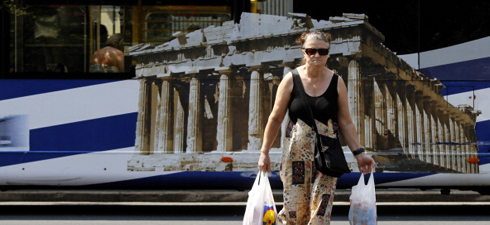As in the dark tragedies of Shakespeare, the Greek political drama can be reversed by a single character. This character isn’t in a starring role, but he is crucial to how the scenes evolve, and not in a positive way, either. Someone like Iago in Othello.
All things considered, this analogy could be applied to Nikos Fotopoulos, the president of the Genop-DEI union (Greece’s public power corporation). Fotopoulos is dark, unshaven, dressed in black and has something theatrical about him. But the analogy fits mostly because this union boss stands centre stage at a critical moment in our national financial tragedy Desperate, the Papandreou government is combing about for around two billion euros to cover the deficit.
To get the money, it’s putting forward the idea of again taxing property, using electricity bills to identify the owners since not all properties have been registered with the modern cadastral offices. Rather usefully, DEI keeps records on the square metres, the age of the property and the neighbourhood. But having to fall back on DEI bills to bring in a new tax (which will be included in the calculation of the bill) is an admission of failure. The government is openly admitting that it has no trust in the mechanisms for tax collection – a sad commentary on the effectiveness of taxes up till now. #### National elite turns against its own government
This year and next year, the government will impose a new extraordinary tax. It’s taking this step because for 20 months it has been struggling in vain to reform public administration, to sell off assets and eliminate some public bodies. There have been cuts to wages but no real reforms. The single salary scale for public servants will have so many exceptions that it will cancel itself out, while assigning civil servants to “non-active service” is just an obscure dodge to save the state from laying off employees.
For in reality, neither PASOK [the ruling Socialist Party] nor the New Democracy [right-wing opposition], dare lay their hands on the state. The state, after all, is their own creation, even if it is a monster. To avoid reforming it, the government prefers to reach into the pockets of all those Greeks who own property. It's a bit of theatre with an invisible director, but, ironically, with walk-on roles for Fotopoulos and the bosses of the Genop-DEI who refuse to let their electricity bills be used to enforce the law imposed by the government.
And so the children of PASOK, who count the elite of the state among them, are rounding on their own government. Better for them that the country sink into bankruptcy than that their perks should be touched. In any event, the cost for the Greeks will be significant.
The problem is that no real tragedy – Shakespearean or financial – has a happy ending. In the end, we’ll have to pay.
Front Page
Coffers almost empty of euros
"There is money only until October," writes an alarmed To Vima. “It’s an urgent matter, and the return next week of the experts from the EU and the IMF will be decisive. The Greek government will do everything it can to ensure the sixth installment of the 100 billion euro loan is granted. Otherwise, default is unavoidable. This is frightening the markets and destablising the government, stunned by the pressure from its creditors and by the statements of German leaders in the press,” the daily notes.
Was this article useful? If so we are delighted!
It is freely available because we believe that the right to free and independent information is essential for democracy. But this right is not guaranteed forever, and independence comes at a cost. We need your support in order to continue publishing independent, multilingual news for all Europeans.
Discover our subscription offers and their exclusive benefits and become a member of our community now!












